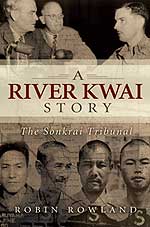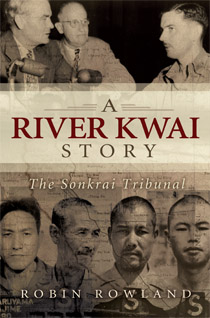This just posted on CBC.ca/news
Alberto Gonzales and the Geneva Convention.
Did the president's lawyer misread the Geneva Convention?
Did Alberto Gonzales, the embattled attorney general of the United States, turn a blind eye to legal history when he wrote a memo to President George W. Bush back in 2002 suggesting ways to avoid the Geneva Convention?
Although my book, A River Kwai Story The Sonkrai Tribunal is largely about the Second World War, it is also about the Geneva Convention and the inhuman treatment of prisoners of war.
So when I was doing my research for the book and I read a key phrase in a memo written January 25, 2002, from Gonzales to President George Bush (and leaked when the Abu Ghraib scandal broke) that said.
. . . some of the language of the GPW [Geneva Convention on Prisoners of War] is undefined (it prohibits, for example, ‘outrages against personal dignity’ and ‘inhuman treatment’) . . .
 I was, to say the least, surprised, since almost all the Far East war crimes trials for the abuse of prisoner of war, charged or contained the phrase "inhuman treatment."
I was, to say the least, surprised, since almost all the Far East war crimes trials for the abuse of prisoner of war, charged or contained the phrase "inhuman treatment." How could the counsel to the president of the United States ignore the suffering of several hundred thousand Allied prisoners of war, including thousands of American POWs?"
It may take many years of history to answer that question.
The CBC news story outlines what Gonzales should have known when he wrote that memo.
The book, of course, will tell the reader, the exact details of the "inhuman treatment" carried out by the Japanese against the men of F Force.
Technorati tags
CBC, journalism, Burma Thailand Railway, World War II, Australia,F Force, Prisoner of War,
military tribunal, Alberto Gonzales, POW, Geneva Convention
Labels: A River Kwai Story, Alberto Gonzales, Burma Thailand Railway, CBC, Geneva Convention, Guantanamo, human rights, Singapore, United States, war crime, World War II

Here is the cover of A River Kwai Story The Sonkrai Tribunal.
Publication date is Friday, July 6, 2007.
More prisoners of war died at Sonkrai than any other camp on the infamous River Kwai Railway. The seven thousand Australian and British prisoners of war who comprised
F Force were sent by the Japanese to build the toughest section of the railway in the mountains between Thailand and Burma. More than three thousand people died from slave labour, disease, starvation and exposure to the never-ending monsoon rain.
In 1946 seven former guards from the infamous River Kwai camp were put on trial for their lives before a military tribunal in Singapore, charged with the deaths of more than three thousand people. The account of the trial tells for the first time the story of F Force from all sides-Australian, British and Japanese-from the lowest private to the lieutenant colonels in command. The testimony, verdict and the surprise sentence shed new light on what really happened on the Railway of Death.
You can view the Allen and Unwin July books international sales page here.
Technorati tags
writing, journalism, Burma Thailand Railway, World War II, Australia,F Force, Prisoner of War,
military tribunal, Alberto Gonzales, POW, book
Labels: Alberto Gonzales, Allen and Unwin, Australia, Burma Thailand Railway, F Force, publishing, Singapore, war crime, World War II
U.S. Attorney General Alberto Gonzales appeared before the Senate Judiciary Committee today.
Most of the American media concentrate in their coverage on the issue of spying and wiretapping-- and missed a major point: the confrontation between Senator Patrick Leahy (D-Vermont) and Gonzales over torture, the torture by Syria, at the behest of the United States, of innocent Canadian citizen Maher Arar.
The CBC covered that and you can watch the video on the CBC news site.
"We knew damn well if he went to Canada he wouldn't be tortured," said Leahy. "He'd be held and he'd be investigated."We also knew damn well if he went to Syria, he'd be tortured. And it's beneath the dignity of this country — a country that has always been a beacon of human rights — to send somebody to another country to be tortured.
"You know and I know that has happened a number of times in the past five years by this country. It is a black mark on us."
Leahy noted that U.S. officials claimed to have had assurances that people sent to Syria would not be tortured.
"Assurances," he snorted, "from a country that we also say now that we can't talk to them because we can't take their word for anything."
CBC News story link. Video link on the right side of the page.
Maher Arar was exonerated by a Canadian Judicial inquiry. Details on the CBC Indepth report.
Labels: Alberto Gonzales, Maher Arar, Patrick Leahy, torture, United States, war crime



